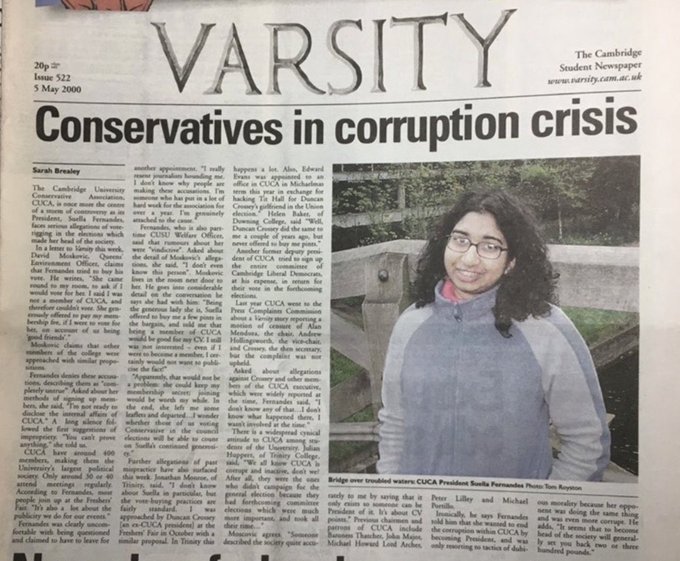What happened on 26th May 2023 - with your comments in the Web
On Friday, an owner of Sainsbury's, the second largest chain of supermarkets in the United Kingdom, tried to convince Britons that they are not profiting from high prices.
When asked if the UK's second largest supermarket had been profiteering, Simon Roberts said: "Absolutely not."Critics have accused food retailers of "greedflation" - putting prices up to bolster profits.
But Mr Roberts told the BBC that Sainsbury's and other grocery chains had spent money to "battle inflation" and avoid passing all of the rising costs onto consumers.
Some Redditors believed him and the data offered by the BBC:
"The figures are out there for anyone to read. The supermarkets have not been profiteering from inflation. The very fact that there has been shortages on the shelves tells you that they refuse to put prices up on some goods."
"Nearly all the profit increase that Sains has been seeing recently is due to the closure of argos stores and the completion of the payments on that deal. Their profit from retail went down during inflation."
"People don't want to hear it, they want someone to blame. Evil corporations, bonuses, shareholders, yadda yadda yadda."
Other bothered to calculate Sainsbury's profit in last four years:
"19/20 - £255m
20/21 - negative £164m (covid)
21/22 - £854m
22/23 - £327m
Revenue/income is important because without that we have no idea how much the increase in profit has added to the food costs
19/20 - £29.00bn
22/23 - £31.50bn
So an extra £150m or so profit in 22/23 compared to pre covid/2019. Am I wrong or does that mean their extra profit would account for around 2.5% of the increase in food prices? If so It's still technically profitting but it's not a big cause in the grand sheme of things since prices seem to have gone up by 25%+ since 2020. They do expect it to go back up to around £600m this year though"
The BBC once again scared us that London saw rise in cases of monkeypox in last month.
Yet, there were more questions to the authors of this piece:
"Latest figures show 10 new infections were diagnosed in London between 30 April and 25 May 2023.
Half of those were unvaccinated, and in two cases, those infected had only received one dose of the vaccine that can protect against the disease.
So 3 people had more than 1 vaccination and still caught it, or 30% of new cases were fully vaccinated?"
"BBC News always get the interns to write their online articles. They try their damndest to make up stories from tweets and then any drivel they do write has to have three incomparable forms of statistics that mean you’ve actually learnt nothing. Add in a vox pop from someone woefully uninformed and you’ve got your guff piece ready to publish!"
That day it had come out that Suella Braverman made front-page news 23 years ago – accused of ‘corruption’.
It was alleged that she offered to bribe a student in exchange for their support. However, this wouldn’t be an early takedown for the future minister. The very next week, Varsity ran a follow-up story, which carried a fierce rebuttal of the accusations, as well as a clarification.
Suella Braverman herself also contributed to the discourse, claiming
that the story was ‘inaccurate’ and ‘false’. In fact, her response was
full of fire and brimstone, as the would-be politician insisted that she
ran ‘unopposed’ during the ballot.
This curious news has attracted a lot of attention.
"If the trend of the last 13 years holds then every Home Secretary gets replaced by someone even worse, so I imagine it'll be Gullis or Anderson next..." - "The reanimated corpse of Thatcher piloted by a particularly angry wasp."
"How can we end up with horseface with less talent than manure. This time next year we'll be thinking 'did the last 5 years actually happen?'"
On Friday as well, transgender women banned from competitive female cycling events by national governing body.
The new policy change ends the hopes of transgender cyclist Emily Bridges of competing in women's competitions.
It is 14 months since the 22-year-old was barred from competing in her first women's event in Derby - when she was due to face five-time Olympic champion Dame Laura Kenny - after cycling's world governing body ruled she was not eligible to race because she was still registered as a male cyclist.
The most popular opinion in the UK Web is that "an open category does seem to be the fairest and most practical solution."
"That’s the plan - I’m involved with cycling races and it sounds like an open category will replace the Men next year.
This will also allow women to join if they have the correct point license.
This is pretty good idea, especially in smaller races where a strong female cyclist would often be overlapping the other competitors (which meant lap tracking was difficult)"
Others approved this ban:
"The correct decision and one that needs reflecting across all athletic sports" - "And importantly, made by the right people.This should never have been an issue of national politics, it's a sporting issue to be handled by sporting organisations."




.jpg)
Comments
Post a Comment